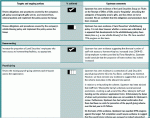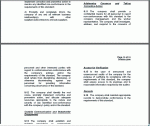 Somewhere around the time British Rail was privatised there was a wonderful quote from one of the presiding ministers: “Only 90% of passenger trains reach an eventual destination”.
Somewhere around the time British Rail was privatised there was a wonderful quote from one of the presiding ministers: “Only 90% of passenger trains reach an eventual destination”.
Ever since then I’ve been deeply concerned about the remaining 10%. Are they lost out there somewhere, haunted by howling commuters, doomed forever to search for the Shangri-La of an “eventual destination”?
As well as showing how important it is for our leaders to think before speaking, this tale also demonstrates the inherent danger in relying upon statistics to prove a point.
So here’s another equally dubious one: less than 2% of UK companies encourage employees to raise their concerns if they believe their employer is breaking the law.
The rest, by definition, are either happy for such employees to approach the media, or are certain their employees will simply stay schtum.
The Single Saint
This cannot be the case and I’m not entirely sure a professional statistician would accept the method of survey which led to this conclusion being drawn: I typed “whistleblowing” into Google, limited the search to the UK, and examined the results returned.
73% of the entries concerned local government, the NHS or universities. Of the remaining results, there were three times as many lawyers offering to take on whistleblowers’ cases as there were companies offering a confidential service.
As there were only 58 results returned this means that are three lawyers offering to take on whistleblowers’ cases and one employer offering a confidential avenue for their employees to raise their concerns.
One employer! Who is this saintly organisation, aware that addressing their employees’ concerns in a direct and confidential manner is good personnel management?
Time Changes Everything
The answer is Land Securities, who describe themselves as “the UK’s largest Real Estate Investment Trust” and has recently won an award for their ISO9001 certified Environment Management System.
Their 2005 sustainability report mentions that one of their targets for that year was to review the company’s whistleblowing policy. It goes on to state that the target was achieved with the policy being implemented across the group.
However, this report was audited by Upstream, a sustainability consultancy which specialises in the property sector. They rated the whistleblowing target as being only 75% achieved due to a lack of transparency on Land Securities’ part.
Since then there has been no mention of whistleblowing in ensuing sustainability reports, no policy published and no contact details advertised on their website.
It is perfectly possible that the company maintains the policy and continues to operate a whistleblowers’ hotline. However it is difficult to escape the suspicion that addressing employee concerns may have slipped down the company’s agenda.
Blowing Up A Storm
Whistleblowing is an important topic within sustainability and can be seen as a form of bellwether for a company’s attitude towards labour standards and its regulatory environment.
It embodies the principle that an employee’s desire to uphold the laws of the land should be more important than their loyalty to their employer. This is something no company should argue against.
Therefore UK law allows employees to make “protected disclosures” if they have reasonable grounds to suspect that the law has been broken or there has been a breach of environmental or health and safety regulations.
In return for making such disclosures employees are protected and may not be subjected to the disciplinary procedure or have their promotion or salary prospects affected.
Obviously, if done in public whistleblowing can be hugely damaging for a company, even if the allegations prove in the end to be false and circumstances misunderstood by the employee in question.
It would therefore seem logical that companies would establish mechanisms for employees to talk in confidence and then advertise the fact they have done so. On the results discussed above, this would not appear to be the case.
Make Your House Clean
Social Accountability International’s SA8000 is currently the leading labour orientated sustainability standard. It covers a wide range of issues relevant to the working conditions of both employees and subcontractors.
In addition it often refers to local laws and requires companies to ensure they are implementing them correctly. So failure to meet the standard can often be interpreted as a failure to adhere to the law.
Its third edition has just been released and it includes this addition to paragraph 9.11:
“The company shall provide a confidential means for all personnel to report non-conformances with this standard to the company management”
There are only four SA8000 certified facilities within the UK; the same number as there is in Poland and definitely less than the 2% of the overall corporate make up quoted above.
At the other end of the scale both China and India have over 100 certified facilities and Italy, somewhat remarkably, has 366.
If standards like this start to increase in their value UK companies could start to loose out simply because they don’t have a policy on how employees can raise their concerns in confidence.
On the other hand, if they’re looking at implementing a standard such as SA8000, one of their best first steps would be to establish, maintain and promote their own whistleblowing mechanism.
(Picture credit: “You Do Know How To Whistle, Don’t You Steve?”, Geekygirl)
A former CTO, Chris has a broad and varied background. He’s been involved with blue chips, consultancies & SMEs across a wide variety of sectors and has worked in Europe, the Middle East and Australia.
In 2007 he decided to combine his knowledge of business and IT with his passion for all things sustainable and has been busy writing ever since. However, his greatest ambition remains to brew the perfect cup of coffee.



Hi Chris!
I was looking for an image about whistling, and came across your article which is of course well-written about corruptions in the companies and employers and whistleblowers, etc.
Do you mind if I used your photo in my FB page?! :) Thank you